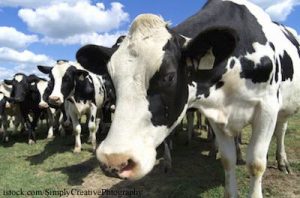A new study funded by the Swiss National Science Foundation and the U.S. National Institutes of Health found that cow manure harbors diverse new antibiotic resistance genes. This material is commonly used as a farm fertilizer. It’s worth noting that produce is one of the main sources of food poisoning in the United States; fertilizer, along with runoff from farms are two of the ways leafy greens and other fruits and vegetables can become contaminated.
 The study, published in American Society for Microbiology journal, tried to find which antibiotic resistant genes are in cow manure. The scientists used a “screening-plus sequencing” approach and found 80 unique and functional antibiotic resistant genes. Those genes made E. coli bacteria resistant to antibiotics.
The study, published in American Society for Microbiology journal, tried to find which antibiotic resistant genes are in cow manure. The scientists used a “screening-plus sequencing” approach and found 80 unique and functional antibiotic resistant genes. Those genes made E. coli bacteria resistant to antibiotics.
Researchers found an entirely new family of antibiotic resistant genes that are resistant to chloramphenicol antibiotics that are used to treat respiratory infections in livestock. The resistance genes were found in clusters and were in a diverse set of species.
This study is the first in a sequence of studies. The scientists are going to see if they can find these genes in the soil, in food, and then in people. These genes can get into the human ecosystem either through bacteria or a horizontal gene transfer into bacteria that affect people.
Previous studies have found antibiotic resistance genes in pigs and chickens, which are given lots of sub therapeutic doses of antibiotics. Cows are not fed as many antibiotics, so the resistant genes found in their manure was important.




